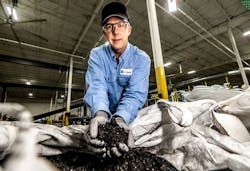Li-Cycle gains $375M conditional DOE loan to fund new Rochester Hub for Recycling Li-Ion Batteries
Battery recycling firm Li-Cycle is celebrating confirmation of a $375 million federal loan to fund construction and development of a commercial-scale resource recovery facility in upstate New York.
The U.S. Department of Energy’s Loan Programs Office, through its Advanced Technology Vehicles Manufacturing (ATVM) program, has entered into a conditional commitment for funding with Li-Cycle Holdings Corp. The $375 million loan could position the company as a key player in a future lithium-ion repurposing industry.
Li-Cycle is developing plans for a first commercial hydrometallurgical resource recovery facility near Rochester, New York. If and when completed, the Rochester Hub could become a destination for battery-grade materials including lithium, nickel and cobalt—all part of chemistries for transportation electrification and energy storage.
The deal is still tentative until other long-form agreements and conditions are met. Li-Cycle hopes to close on the agreement by the second quarter.
“We are delighted to receive the first conditional commitment from the DOE LPO for a resource recovery facility, as it further supports our efforts to create a sustainable domestic supply chain of battery-grade materials in the U.S. and to grow American jobs,” said Ajay Kochhar, Li-Cycle Co-Founder, President and Chief Executive Officer. “The Rochester Hub is a cornerstone asset for Li-Cycle and its stakeholders and will be an important contributor to the clean energy economy. As a sustainable pure-play battery material recycling company, we expect the Rochester Hub will position Li-Cycle as a leading domestic producer of recycled battery-grade materials for accelerating electrification demand to address climate change and secure energy independence.”
Li-Cycle also is planning to commission the Rochester Hub by late this year. It could have capacity to process 35,000 metric tons of black mass to produce battery grade materials annually, according to reports.
Last year, the company started commercial operations at a battery recycling facility in Alabama. Li-Cycle expects companywide capacity to reach 65,000 metric tons of recycling per year by the end of 2023, according to reports.
Batteries and Beyond: See EnergyTech's full coverage of Energy Storage stories
Subscribe to our free, tri-weekly newsletter for regular Insights into the C&I Energy Transition
One of the challenges facing the e-mobility industry is what to do with batteries at the end of life. Recycling materials is part of the goal for circular supply chains.
However, only two to 11 percent of lithium-ion batteries used by customers make it to recycling facilities after they had considered useless in first life. according to reports.
Last week, Ecobat announced its plans to build its first North American lithium-ion battery recycling facility in Casa Grande, Arizona. Lithium-ion currently makes up about 90 percent of the chemistries used in larger-scale batteries.
Mordor Intelligence has forecast a nearly double-digit percentage annual growth in the li-ion battery recycling market through this decade.
The DOE ATVM loan would have a term of up to 12 years from financial close of the agreement. Interest on the loan would measure up to the 10-year U.S. Treasury rate from the date of each advance for the loan, according to Li-Cycle.
In November 2022, DOE announced $73.9 million in funding for 10 other projects focused on electric vehicle battery recycling solutions.
-- -- --
(Rod Walton, senior editor for EnergyTech, is a 15-year veteran of covering the energy industry both as a newspaper and trade journalist. He can be reached at [email protected]).
Follow us on Twitter @EnergyTechNews_ and @rodwaltonelp and on LinkedIn
About the Author
Rod Walton, EnergyTech Managing Editor
Managing Editor
For EnergyTech editorial inquiries, please contact Managing Editor Rod Walton at [email protected].
Rod Walton has spent 17 years covering the energy industry as a newspaper and trade journalist. He formerly was energy writer and business editor at the Tulsa World. Later, he spent six years covering the electricity power sector for Pennwell and Clarion Events. He joined Endeavor and EnergyTech in November 2021.
Walton earned his Bachelors degree in journalism from the University of Oklahoma. His career stops include the Moore American, Bartlesville Examiner-Enterprise, Wagoner Tribune and Tulsa World.
EnergyTech is focused on the mission critical and large-scale energy users and their sustainability and resiliency goals. These include the commercial and industrial sectors, as well as the military, universities, data centers and microgrids. The C&I sectors together account for close to 30 percent of greenhouse gas emissions in the U.S.
He was named Managing Editor for Microgrid Knowledge and EnergyTech starting July 1, 2023
Many large-scale energy users such as Fortune 500 companies, and mission-critical users such as military bases, universities, healthcare facilities, public safety and data centers, shifting their energy priorities to reach net-zero carbon goals within the coming decades. These include plans for renewable energy power purchase agreements, but also on-site resiliency projects such as microgrids, combined heat and power, rooftop solar, energy storage, digitalization and building efficiency upgrades.

